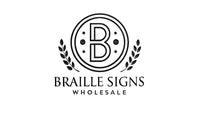The Art of Accessibility: How ADA Signage Transforms Business Spaces
A Canvas of Inclusivity
In the vibrant tapestry of today's business world, accessibility is more than a legal checkbox—it's a moral brushstroke that paints a picture of inclusivity. ADA signage, a crucial element in this masterpiece, ensures that businesses open their doors wide to everyone, including those with disabilities. By embracing ADA signage requirements, businesses not only comply with the law but also craft an environment that is as welcoming as it is supportive.
Decoding the ADA Signage Palette
The Americans with Disabilities Act (ADA) is a landmark piece of legislation that has reshaped the business landscape. At its core lies ADA signage, a tool that empowers individuals with disabilities to navigate public spaces with confidence. ADA signage compliance isn't just about ticking boxes; it's about enhancing accessibility and creating a seamless experience for all.
The Art of ADA Signage Design
Typography: The Font of Accessibility
Imagine a world where words are as clear as a summer's day. ADA signage requirements dictate the use of sans-serif typefaces with uppercase letters standing at a minimum height of 5/8 inch. This ensures that the text is not just readable but a beacon for those with visual impairments.
The Dance of Contrast and Color
Contrast is the unsung hero of readability. Whether it's light text on a dark background or the reverse, this visual dance ensures that signage is visible to everyone, including those with low vision.
The Braille Touch
Incorporating Grade 2 Braille is a vital stroke in the ADA signage compliance canvas. Placed below the corresponding text, Braille allows individuals who are blind or have severe visual impairments to access information with ease.
Navigating Spaces with ADA Signage
ADA signage is the compass that guides individuals with disabilities through the labyrinth of public spaces. Its strategic placement and comprehensive coverage transform navigation into an art form, enhancing the overall customer experience and ensuring that everyone can find their way with ease.
Overcoming the Challenges of ADA Signage
The Knowledge Gap
Understanding ADA signage requirements can be as complex as a cubist painting. This knowledge gap can lead to non-compliance, with potential legal and reputational consequences.
Budgeting for Accessibility
Allocating resources for ADA signage might seem daunting, but the long-term benefits—like increased customer satisfaction and potential revenue growth—are worth the investment.
Mastering the Craft of ADA Signage
Choosing the Right Signage
When selecting ADA signage, focus on tactile features and Braille. Optimize mounting height and placement, choose high-contrast, non-glare materials, and select readable fonts and symbols. Collaborating with compliance experts ensures your signage meets all necessary standards.
Keeping the Canvas Fresh
Regular cleaning and inspection of ADA signage are crucial for maintaining compliance. Stay informed about regulation changes and update your signs as needed. Promptly replacing damaged signs ensures continuous accessibility.
The Ripple Effect of ADA Signage
ADA signage is more than a legal requirement; it's a commitment to inclusivity and accessibility. By investing in ADA signage compliance, businesses enhance their reputation for inclusivity and respect for all customers. This dedication can lead to increased customer satisfaction and potentially boost sales, as customers are more likely to support businesses that prioritize accessibility.
Your Partner in Accessibility
For businesses eager to enhance their ADA signage, BrailleSignWholesale offers a variety of ADA-compliant signage solutions. Explore options like the Epsilon Room ID C 8" x 6", Epsilon Corridor Sign B 8" x 8", and Epsilon Stair ID 6" x 8". These products are designed to meet ADA requirements while offering customizable options to suit any business environment.









